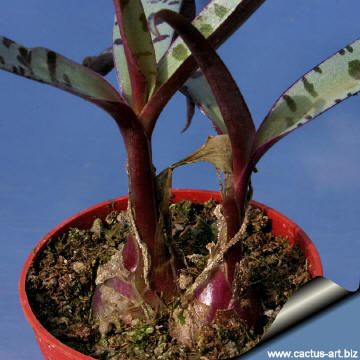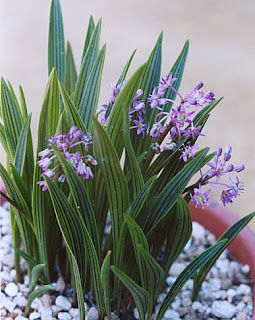
Ledebouria socialis (sin. Scillia violacea)
Description: Small evergreen perennial bulbs in thick clusters that survive drought as effectively as any succulent.
Bulb: Teardrop-shaped, green to purple, clothed in peeling, papery tunics that prevent water loss, 2-4 cm centimetres in diameter that necks above soil, it will soon cluster.
Leaves: Lance-shaped, strap-like, 10-15 cm long and 2 cm wide, upright, fleshy, light silvery green, and basal with dark-green, turquoise, olive or aquamarine markings above and wine-red to purple beneath.
Flowers: Forms racemes of bell-shaped flowers. They are showy, greenish purple-pink with a small pink stripe running down each petal, can be up to 20+ flowers on each spike.
Blooming season: Spring and summer.
Bulb: Teardrop-shaped, green to purple, clothed in peeling, papery tunics that prevent water loss, 2-4 cm centimetres in diameter that necks above soil, it will soon cluster.
Leaves: Lance-shaped, strap-like, 10-15 cm long and 2 cm wide, upright, fleshy, light silvery green, and basal with dark-green, turquoise, olive or aquamarine markings above and wine-red to purple beneath.
Flowers: Forms racemes of bell-shaped flowers. They are showy, greenish purple-pink with a small pink stripe running down each petal, can be up to 20+ flowers on each spike.
Blooming season: Spring and summer.
Cultivation: Ledebouria socialis is an easy-to-care plant. It needs full sun to partial shade with a well-drained soil mix. Let it dry completely between waterings. Feed monthly with 50% strength soluble house plant food when it is actively growing. Hardy down to freezing so best kept in a frost free place indoors and can be grown outside where there is no danger of frost. Bulbs at the base of the plant must be above the soil. It is very happy sitting in window sill too.
Propagation: Seeds or (usually) by division of bulb-clusters
Propagation: Seeds or (usually) by division of bulb-clusters
 Ledebouria cooperi
Ledebouria cooperi